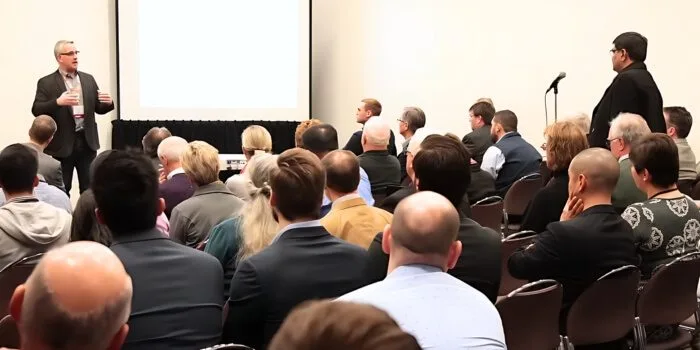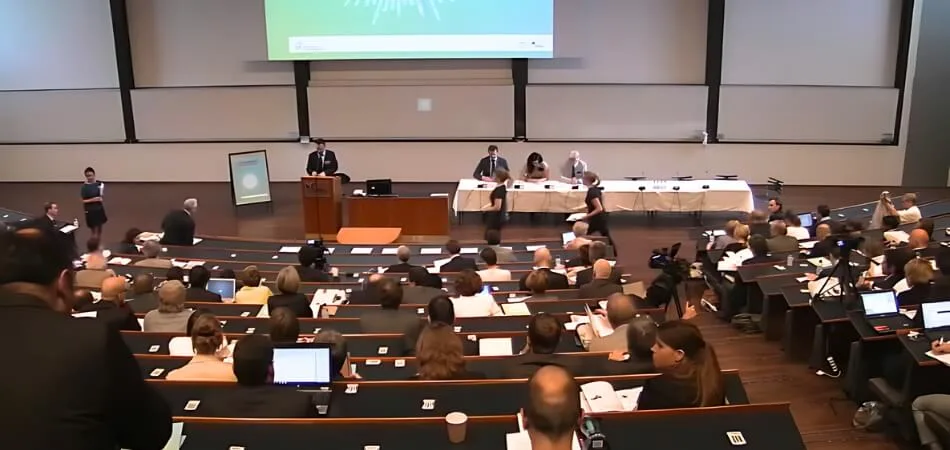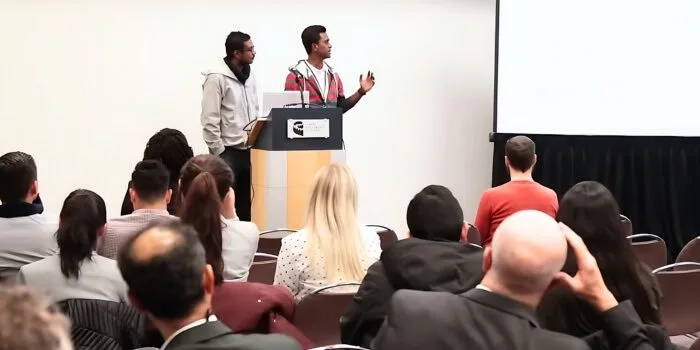Attending a conference can be a rewarding experience filled with new ideas, networking opportunities, and a plethora of information. This information can be difficult to understand for many attendees. As a result, many individuals wonder if is it normal to feel less confident after attending conferences.
Yes, it is. It’s common to face confusing information or new perspectives that challenge your existing beliefs, leading to a whirlwind of self-doubt and uncertainty. This feeling is a natural response to being exposed to new ideas and can actually be a sign of growth.
In this article, we’ll explore why this happens and how to navigate these feelings of uncertainty. So, if you’ve ever left a conference feeling more unsure than when you arrived, keep reading.
What is a Conference About?
The purpose of a conference is to bring together individuals from similar fields to exchange ideas and learn about new trends. It’s a platform for networking, sharing knowledge, and fostering professional relationships. Attendees can gain insights, find inspiration, and discuss challenges within their industry.

This type of event usually features speakers, workshops, and panels to provide a comprehensive learning experience. Participants come from diverse backgrounds, contributing to a rich tapestry of perspectives and experiences. It’s an opportunity to step out of your daily routine and engage with fresh concepts and approaches.
Is It Normal to Feel Less Confident After Attending Conferences?
Yes, it’s quite common to feel less confident after attending conferences. This feeling often results from the introduction to new information and perspectives. It can challenge your existing beliefs and make you question your knowledge and abilities.
Introducing New Information
Taking part in a conference allows you to stay up to date on the latest industry trends and innovations. As a result of this, you may be able to identify areas where you have knowledge gaps that need to be filled. You may compare yourself to experts in the field, which might affect your post-conference confidence.
Comparison with Others
If you are attending a conference, you will encounter a lot of accomplished professionals. It’s natural to compare your accomplishments to theirs. This may lead to feelings of self-doubt if there is a perceived gap between them and yours.
High Expectations
A lot of people attend conferences with high expectations in terms of learning and networking. When these expectations are not met, they can be disappointed, which can be mistaken for a lack of confidence. It is imperative that you set realistic expectations for conference outcomes.
Affected by Information Overload
There can be a lot of information and choices on a conference floor. It can be overwhelming and exhausting to process all of this information. It is normal to feel uncertain during this adjustment period. Give yourself time to absorb and understand what’s being said.
Fear of Missing Out (FOMO)
Many networking events and sessions may cause fear of missing out (FOMO). You might worry about not attending the ‘right’ sessions or meetings. This can diminish your sense of accomplishment. Acknowledge that it’s impossible to cover everything; focus on what you did learn.
Adapting to Change
Getting used to new behaviors, practices, and technologies introduced during a conference can be a challenge. The adjustment process can be both challenging and uncomfortable. It is normal to be less confident as you learn and grow, so accept the discomfort as a part of your learning process.
Social Pressure
The social aspect of conferences can be daunting. Trying to make connections with peers and industry leaders can induce anxiety. This social pressure can impact your confidence levels. Remember, most attendees likely share similar feelings.
Post-Conference Reflection
After the event, you might reflect on your experiences and interactions. This reflection can intensify feelings of self-doubt. Use this time wisely to identify areas for growth. Remember, self-reflection is a key step in personal and professional development.
Action Plan Development
Creating an action plan post-conference can also be challenging. Deciding which ideas to implement first can cause indecision. However, this planning is crucial for personal growth and professional advancement. Break down the plan into manageable steps to ease the process.
Cultural and Environmental Differences
For some, the conference environment may be very different from what they are used to. Navigating new cultural norms and expectations can be challenging. This can affect your confidence if you feel out of place. Recognize that everyone adjusts at their own pace.
Expectations Versus Reality
Your pre-conference expectations might not align with the actual experience. This discrepancy can lead to feelings of disappointment or inadequacy. Realign your expectations with reality and focus on the positives. Learning comes from recognizing what it is, not what we wish it to be.
Personal Growth and Resilience
Feeling less confident after a conference can be a sign of growth. It shows you’re stepping out of your comfort zone. This is where real learning and development happen. Accept these feelings as part of your journey to resilience and self-improvement. It is natural to feel less confident after attending a conference. Accepting this discomfort can lead to personal growth, resilience, and a deeper understanding of your path in professional development.
How to Keep Your Confidence Intact After Attending Conferences?
You might come away from a conference filled with ideas, but you might also feel overwhelmed. It’s natural to compare yourself to others and question your capabilities. However, maintaining your confidence post-conference is key to leveraging what you’ve learned effectively, especially if you’re attending a conference for the first time.
Step 1: Reflect Positively
Start by reflecting on the experience positively. Identify three key takeaways or learning points from the conference. This helps shift your focus from depressing feelings to positive insights.
Step 2: Set Realistic Goals
Break down the new information into actionable goals. Start with small, achievable objectives to avoid feeling stressed. Celebrating small wins builds confidence and momentum.
Step 3: Connect with New Contacts
Reach out to people you met or speakers whose work you admired. A simple message appreciating their presentation can open doors to beneficial conversations. This strengthens your network and places you within a community of like-minded professionals.
Step 4: Share Your Learnings
Share the knowledge you’ve gained with your team or through social media. Teaching others not only strengthens your understanding but also establishes your expertise. It’s a confidence booster to see others value your insights.
Step 5: Focus on Continuous Learning
Recognize that everyone at the conference is there to learn. Adopt the idea of continuous improvement rather than perfection. This mindset helps you view challenges as opportunities to grow.
Step 6: Practice Self-Care
Post-conference, ensure you take time for rest and reflection. Physical well-being impacts mental clarity and confidence. A rested mind is more capable of positive thinking and strategic planning.
Maintaining confidence after a conference is about perspective, planning, and action. Remember, every professional, regardless of their stature, started somewhere and faced doubts along their journey. Take advantage of the learning process, apply the insights gained, and let every conference be a stepping stone to greater confidence and success.
How Can I Use Social Media to Maximize My Conference Experience?
- Social media offers a powerful way to enhance your conference experience and connect with others. By using these platforms, you can share insights, engage with attendees, and expand your professional network. Here are some tips to make the most of social media during the conference.
- Follow the Conference Hashtag: Use the official conference hashtag to keep up with live updates and important announcements. This helps you stay informed and participate in the broader conversation.
- Engage with Speakers and Attendees: Tag speakers and other attendees in your posts. A simple message of appreciation or sharing insights can foster connections and open doors to future collaborations.
- Share Key Takeaways: Post your thoughts on sessions you attended by sharing key insights and takeaways. This not only helps reinforce your own learning but also benefits your followers.
- Join Online Discussions: Participate in relevant discussions on social media platforms, like Twitter and LinkedIn. Engaging in these conversations can help deepen your understanding of topics covered at the conference.
- Connect with New Contacts: After meeting people at the conference, connect with them on social media. A quick message can remind them of your conversation and strengthen your professional relationship.
- Post Live Updates: Share live updates during sessions or workshops to keep your followers informed about what you are learning. This not only boosts your profile but also encourages interaction.
- Reflect on Your Experience: After the conference, share a summary of your experience and insights gained. This helps consolidate your learning and showcases your commitment to professional development.
Using social media effectively can greatly increase your conference experience. By engaging with others and sharing your journey, you create opportunities for growth and connection that extend beyond the event itself.
Tips to Maximize the Benefits of Conference Learnings?
The benefits of attending a conference include gaining knowledge and making connections that can help you advance your career. To ensure you make the most out of these experiences, it’s crucial to apply and share the insights gained effectively.
- Reflect on Key Takeaways: After the event, identify the most impactful ideas and how they align with your current goals.
- Organize Your Notes: Review and categorize your notes to create a clear action plan for implementation.
- Discuss with Peers: Sharing knowledge with colleagues helps solidify your understanding and brings fresh perspectives.
- Implement New Strategies: Apply the relevant insights to your projects or work processes as soon as possible.
- Follow Up with Contacts: Strengthen your network by reconnecting with those you met, and discussing potential collaborations.
- Document Your Learning: Record your experiences, highlighting the things to share after attending a conference to benefit your team.
- Stay Updated: Continue to explore and expand on the topics discussed, ensuring long-term learning.
Conferences can be a turning point in your professional journey when approached strategically. By following these steps, you can transform the information gathered into actionable improvements and lasting relationships.
Frequently Asked Questions
Many attendees experience a mix of emotions after a conference, including a dip in confidence. It’s a common response that’s not often discussed. Here are five FAQs to help understand this phenomenon.
Why Do I Feel Insufficient Compared to Others at Conferences?
Feeling insufficient is a common reaction when comparing yourself to others, especially those who appear more successful. Remember that everyone’s journey is unique, and the purpose of conferences is to inspire and educate, not to scare or create self-doubt.
How Can I Overcome Feeling Overloaded by New Information at A Conference?
Start by breaking down the information into smaller, manageable sections. Set realistic goals to gradually learn and apply new concepts. It’s important to understand that no one expects you to grasp everything immediately; take it step by step and be patient with your progress.
What Should I Do if I Didn’t Meet My Goals at The Conference?
Reflect on why your goals weren’t met and consider whether they were realistic in the first place. Use this experience to set more achievable goals for the next event. Remember, each experience is an opportunity for growth, and not meeting goals doesn’t mean failure.
How Can Attending Conferences Actually Boost My Confidence?
Attending conferences allows you to learn new skills and expand your network, both of which can significantly boost your confidence. By applying what you’ve learned and building connections, each conference can contribute to your professional growth and self-assurance over time.
Why Do I Feel More Confident After Sharing What I Learned at A Conference?
Sharing what you learned at a conference with others not only reinforces your own understanding but also helps establish your expertise. By discussing key takeaways, you validate your knowledge, which in turn, can enhance your confidence and contribute to your ongoing professional development.
End Notes
The purpose of conferences is to push the boundaries of knowledge and comfort. Often left feeling frustrated or less confident, they combine learning, networking, and personal development opportunities.
It’s satisfying to know that others feel the same way. The question, “Is it normal to feel less confident after attending conferences?” finds its solution in the shared experiences of many professionals.
When we accept this as part of the growth process, we can approach these events with a more positive mindset and ultimately turn fear into action. Every conference is a chance to learn, adapt, and grow in your professional career.







